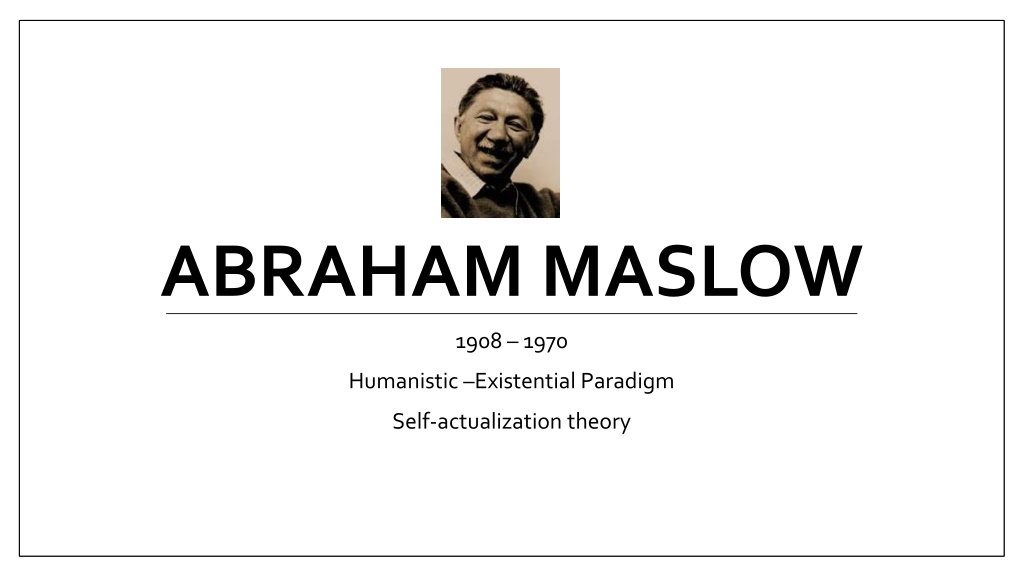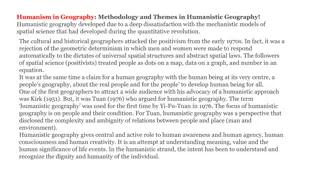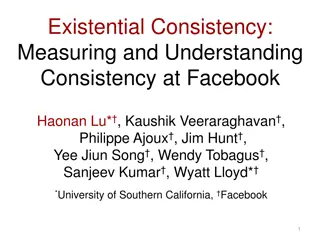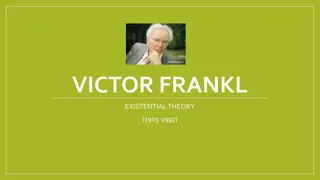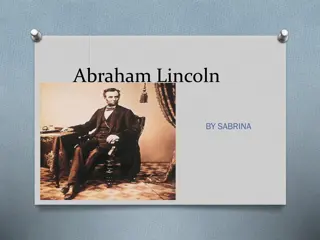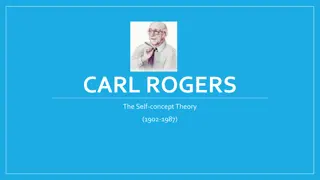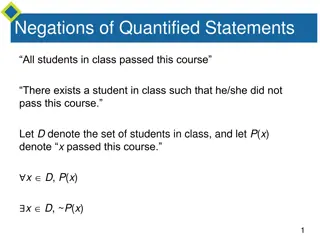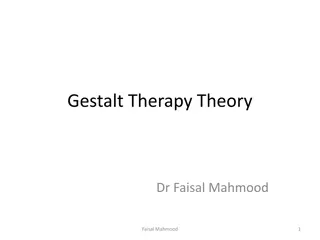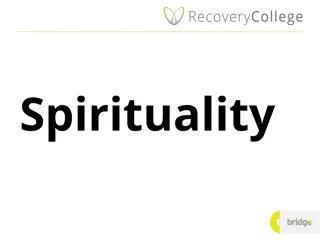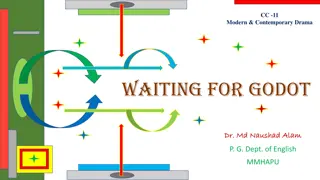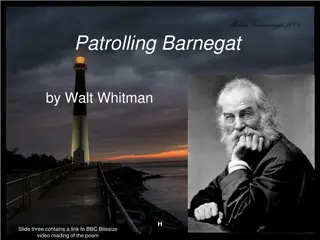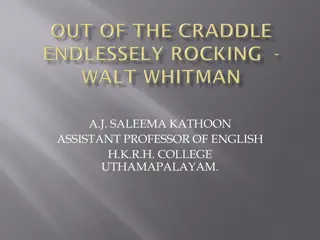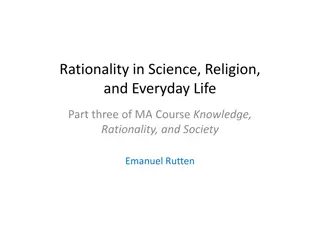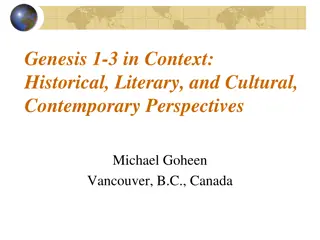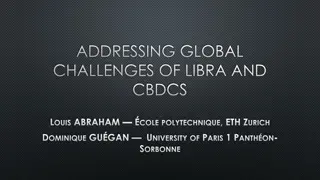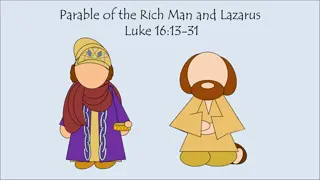Understanding Abraham Maslow's Humanistic Existential Paradigm
Explore the key concepts of Abraham Maslow's humanistic existential paradigm, including self-actualization theory, perspective, and views on need gratification. Learn about Maslow's belief in human potential, the motive for self-actualization, and the importance of need gratification in realizing individual potential and healthy development.
Download Presentation

Please find below an Image/Link to download the presentation.
The content on the website is provided AS IS for your information and personal use only. It may not be sold, licensed, or shared on other websites without obtaining consent from the author. Download presentation by click this link. If you encounter any issues during the download, it is possible that the publisher has removed the file from their server.
E N D
Presentation Transcript
ABRAHAM MASLOW 1908 1970 Humanistic Existential Paradigm Self-actualization theory
Which of the following statements are true with reference to Maslow s theory? When all basic needs are met, people are self-actualised. a. The tendency towards self-actualisation requires the regular gratification of lower level needs. b. To be self-actualised is to accept the responsibility to be all you can be. c. Once we are motivated by growth motives, deficiency motives fall away. d. The correct answer is: (a) and (b) 1. (b) and (c) 2. (c) and (d) Answer: 2 3. (a) and (d) 4.
Maslows perspective is characterised by: Its emphasis on human potential a. The conviction that people are essentially good and worthy b. The emphasis on healthy and optimal functioning c. The belief that human development can be explained in terms of need gratification d. The correct answer is: All of the above 1. (a) & (b) 2. Answer: 1 (c) & (d) 3. (a),(b) & (c) 4.
According to Maslows theory, the concept of ___ explains how an individual is viewed as an integrated whole, as a person with worth and dignity and as one who strives towards the actualisation of his/her potential Optimism 1. Humanism 2. Self-actualisation 3. Phenomenology 4. Answer: 2
According to Maslow self-actualisation: Refers to a realistic evaluation of one s potential 1. Is the motive to realise one s true potential 2. Refers to healthy development 3. Dominates all other human needs 4. Answer: 2
According to Maslow, need gratification: Is a process of fulfilling basic needs through strictly successive, developmental stages a. Refers to self-actualisation b. Is a means of relieving tension c. Is the basis for growth and the realisation of an individual s potential through self-actualisation d. The correct answer is: All of the above 1. (a) & (b) 2. Answer: 3 (c) & (d) 3. (b),(c) & (d) 4.
Which of the following most accurately explain Maslows view of the person? An individual has the potential to reach his/her highest level of functioning a. An individual has an active will to develop, grow and reach his/her true potential. b. Human behaviour can be explained in terms of need gratification since this largely forms the basis for growth and self-actualisation c. Human behaviour is goal-directed and an individual is viewed as the central figure in the actualisation of his or her own potential. d. The correct answer is: All of the above 1. (b), (c) and (d) 2. Answer: 1 (a), (b) and (c) 3. (c) and (d) 4.
According to Maslows conceptualisation of a hierarchy of needs: Self-actualisation is a core need that dominates all other needs from birth onwards. 1. The lower the need in the hierarchy, the weaker it is. 2. Development progresses through successive stages of need gratification. 3. Growth motives refer to experiencing love and acceptance. 4. Answer: 3
According to Maslow, the satisfaction of self-esteem needs is mainly determined by (1) self-respect and appreciation by others. (2) peak experiences. (3) spontaneity, simplicity and naturalness. Answer: 1 (4) self-actualisation. Self-esteem is derived from a sense of efficacy or capability with regards to one s own achievements as well as from recognition of one s achievements by others. Alternative (1) is therefore correct.
Maslows self-actualisers (1) take delight in simple pleasures. (2) are the most perfect individuals. (3) conform to social norms. Answer: 1 (4) are dependent on others. (1): Self-actualisers are able to find pleasure in the small things in life. However, they are not perfect. Self-actualisation means that a person is able to discover and realise their fullest potential, but this does not make them perfect. Alternatives (3) and (4) are also incorrect: Self-actualisers do not conform to social norms but function relatively independently from their physical and social environment. They value autonomy and do not depend on external rewards such as popularity or prestige.
According to Maslow the self-actualisers is one who Is free from experiencing feelings of anxiety, guilt and conflict a. Sees past the barriers that people erect, recognising reality for what it is b. Laughs not only at the expense of others, but is also able to treat his/her own feelings of inferiority with lightness c. Approaches life with the fresh naivety of a child. d. The correct answer is: Answer: 1 1. (a), (b) & (d) 2. (a) & (b) 3. (c) 4. (b) & (d)
According to Maslow, the satisfaction of self-esteem needs is mainly determined by (1) self-respect and appreciation by others. (2) peak experiences. (3) spontaneity, simplicity and naturalness. Answer: 1 (4) self-actualisation. Self-esteem is derived from a sense of efficacy or capability with regards to one s own achievements as well as from recognition of one s achievements by others. Alternative (1) is therefore correct.
Which one of the following statements correctly reflects Maslow s view? Self-actualisers are sociable people who like to have constant contact with other people. 1. Self-actualisers are achievers who will use any means to reach the high goals they have set themselves. 2. Self-actualisers function relatively independently of their physical and social environment. 3. Self-actualisers tend to be autocratic since they are functioning on a higher level than most people. 4. Answer: 3 Maslow stressed that self-actualising individuals are characterized by amongst others, the ability to observe reality more accurately. This means that, accurate observation assists them to make informed and accurate decision in reaching their goals, as opposed to using any means available to them as suggested by statement (2). Self-actualisers know when to disengage from social encounters and to enjoy isolation and privacy, as opposed to being in constant contact with other people as suggested by statement (1). Furthermore, self- actualisers are democratic in the widest sense of the word, which is in direct contrast with what statement (4) suggests. Yes, indeed, self-actualisers are described amongst others as individuals who function relatively independently of their physical and social environment and depend on their own potential to grow. Alternative (3) is therefore the correct option .
In terms of their interpersonal relationships, Maslow found that self-actualisers Are exclusive and disengaged from any real involvement with others 1. can be identified as cold and distant toward ordinary people 2. Acquire admirers, followers and disciples who demand more from self-actualisers that they can offer 3. Include in their close circle of friends each and every one irrespective of capacity, talent and level of growth 4. Answer: 3
On the basis of biographical information he assembled about people who are highly self-actualising, Maslow set out to describe the characteristics of the optimally functioning person. Which of the following statements are accurate descriptions of some of these characteristics? a. The behaviour of self-actualisers is spontaneous and without superficiality and pretence Self-actualisers become irritated by the deficiencies of ordinary people Without exception, self-actualisers are involved in a cause outside their own skins Self-actualisers sometimes tire of the simple and basic enjoyments of life b. c. d. The correct answer is: (a), (b), (c) & (d) (a), (b) & (c) (a), (c) & (d) (a) &(c) 1) 2) Answer: 4 3) 4)
According to Maslow, the person who functions optimally can meet his or her deficiency needs regularly. has accepted the responsibility of self-actualisation. is functioning at the level of self-actualisation. a. b. c. The correct answer is: (a) (b) (a) and (c) (a), (b) and (c) 1) Answer: 4 2) 3) 4) The description of an optimally developed person is outlined fully on pg. 347- 352, MMV. With that in mind, it is pretty obvious that all the above listed statements are correct. Alternative (4) is therefore the correct option.
According to Maslow, the person who functions optimally is someone who a. Subjects his or her own needs for self-actualisation to the injunction to conform to the demands and prevailing norms of society Needs the rewards and recognition and acclaim of his or her social circle and of society at large in order to realise his or her potential Functions relatively independently of his or her physical and social environment Has accepted the responsibility of becoming the best that he or she can be b. c. d. The correct answer is: (a) and (b) (a) and (d) (a), (b) and (d) (c) and (d) Answer: 4 1) 2) 3) 4)
Read the following for the next 2 Qs. Samuel is a teenage boy and an only child. Although his family did not have much, there was always food on the table and a roof over his head. His mother and father were loving and supportive parents who took good care of him. Samuel enjoyed school and had many friends. He was earning good grades and was recognised as the top performer in his class. Tragically, Samuel s parents were killed in a car accident a few months ago. After the accident, Samuel was placed in foster care. A few months later, his grades started to drop and he started missing school regularly. Samuel told the social worker assigned to his case that, although he had a place to stay and food to eat, his foster parents were both very busy and had little time for him. He also told the social worker that he had joined a gang who understood him and what he was going through.
According to Maslows theory, prior to the accident in which his parents were killed, Samuel was functioning at the level of ____________ needs. physiological a. self-esteem b. affiliation and love c. safety d. The correct answer is: (a) and (b) 1. (b) and (c) 2. Answer: 2 (c) and (d) 3. (a) and (d) 4.
Maslow selected representatives of the best in human nature that he could find, in order to elucidate his concept of self-actualisation. He concluded that: The need for self-actualisation only operates in the lives of a small group of highly select people 1. Self-actualisers have reached a level of human perfection 2. Because they are so way above the average, ordinary people will not approach self- actualisers for support and advice 3. Fallibility and human weakness remain part of human being, no matter what level for psychological growth is achieved 4. Answer: 4
Which of the following statements about the need for self-esteem in Maslow s hierarchy is/are correct? It matters less how one achieves the respect one needs than the fact that one receives it In order to be solid one s self-esteem should be based on one s actual worth and not on the opinions of others The need occurs after the need for safety and before the needs for love and affiliation in the hierarchy When a person s need for self-esteem is unfulfilled he/she may feel inferior, weak and helpless a. b. c. d. The correct answer is: (a) & (c) (b) & (d) (a) & (d) (b), (c) and (d) 1) 2) 3) Answer: 2 4)
According to Maslow, the person who functions optimally is someone who: Has overcome the restrictions of the environment and is able to satisfy his or her needs on all four lower levels of the hierarchy on a regular basis. a. Does not pay particular attention to the moral and ethical codes of society but abides by his or her own rules b. Has accepted the responsibility of self-actualisation and has become the best person that he or she can be c. Has self-knowledge and self-insight, and observes and recognises reality for what it is. d. The correct answer is: All of the above (d) (a), (c) and (d) (a), (b) and (c) 1) Answer: 1 2) 3) 4)
Which of the following statements most accurately describe Maslow s view on psychopathology? Psychopathology results from the failure of the environment to provide for an individual s basic needs a. Unfulfilled basic needs will reach pathological levels only in a person to whom these needs represent some form of deficiency in their lives b. Over-gratification of needs can lead to pathology c. Unfulfilled meta-needs could lead to pathological conditions called meta-pathologies. d. The correct answer is: All of the above (a), (c) and (d) (a) & (b) (c) & (d) 1) Answer: 4 2) 3) 4)
In order to prevent psychopathology in society, Maslow believed that Ample provision should be made for the gratification of the basic needs of people a. The fulfilment of meta-needs of people should be deemed important b. There should be respect for the dignity and rights of every person c. The over-gratification of needs should be encouraged to ensure the optimal mental health of people d. The correct answer is: (a), (b) and (d) 1) Answer: 3 (a), (b) and (d) 2) (a) & (b) 3) (b), (c) & (d) 4)
According to Maslow, self-actualisation is not always attained because most people evade responsibilities and shy away from the challenge to realise their talents and work towards self-actualisation. a. The correct answer is: All of the above 1. the social environment can place obstructions in the way of a person s growth towards self-actualisation. b. (a), (b) & (d) 2. (b), (c) & (d) 3. it is a developmental achievement which only exceptional people attain. The ordinary person does not feel the need to function on the higher levels of self-actualisation. c. (c) & (d) 4. Answer: 2 most people have poor self-knowledge and do not know what they are capable of and consequently fail to realise their potential. d. Maslow emphasized that it is every individual s ultimate goal to reach his or her true potential Furthermore, the tendency towards self- actualisation is the tendency that underlies all behavior. It is then not true to say that ordinary people do not have the need to function on the higher level of self-actualisation. Read pg. 346, MMV to get more clarity on why statements (a), (b) and (d) are correct.
Maslow believes that meta-needs: The correct answer is: must be fulfilled to ensure maximal growth. a) All of the above unlike basic needs, are not innate. 1. b) (a), (c) & (d) if unfulfilled, can also lead to pathological conditions. 2. c) (b), & (d) 3. refer to self-actualisation. d) (b) & (d) 4. Answer: 2 Maslow stated very clearly that meta-needs are innate, just like basic needs and they also need to be fulfilled to ensure maximal growth. Self-actualization encompasses the meta-needs and when these needs are not met or fulfilled, they may lead to pathological conditions. In line with this explanation, all the above listed statements are correct except for statement (b). Therefore, (2) is the correct alternative. .
Joining a gang who understood the challenges he faced since the death of his loving parents indicates that Samuel has regressed to the level of ____________ needs in the hierarchy. physiological 1. self-esteem 2. affiliation and love 3. safety 4. Answer: 3 Samuel was placed in foster care where there was food on the table and a roof over his head. Thus, his physiological needs and safety needs were being met. Samuel maintains that his foster parents did not have time for him. His needs for affiliation and love were therefore not being met. He thus regressed from functioning at the level of self-esteem to a lower level because, after losing the support and love of his parents, he was motivated by the need for love and affiliation. By joining the gang, he was looking to satisfy his needs for love and affiliation.
1 a. spontaneity, simplicity and naturalness b. he is able to see past the barriers his captors erect 2 a. the consistent renewal of appreciation b. his appreciation of their humanity shows that he does not tire of the simple, basic enjoyments of life 3 a. discriminating between means and goals b. he has a strong moral code and knows the difference between right and wrong, good and evil 4 a. social feelings b. he is able to demonstrate a concern for humankind in general Answer: 4
According to Maslows views on self-actualisation, which one of the following statements would most accurately describe Jane s and Emily s equal success at school? Emily is functioning below her potential, as her favourable home circumstances should lead her to achieve more than Jane 1. While successful, Jane is still not realising her true talents, as her lower order needs are not being regularly satisfied 2. Jane s ability to perform as well as Emily, despite her difficult home circumstances, indicates that she is functioning at the level of self-actualisation 3. None of the above 4. Answer: 4
According to Maslows views on self-actualisation, which one of the following statements about Jane s and Emily s fathers would you consider the most accurate? Jane s fathers willingness to take the advise of his friends rather than follow his own course is a sign of the trusting nature of the self-actualiser a. Emily sfather s courage to take a risk and start a new business is regarded as necessary for self-actualisation to occur b. Janes father s following of the cultural stereotype that men can only grieve by losing themselves in their work is an example of the lack of integration that prevents self-actualisation c. Emily sfather s decision to use all his pension money to start the new business seriously threatened his esteem needs, thereby blocking the path to self-actualisation. d. The correct answer is: 1. (b) & (c) 2. (a) & (b) 3. (c) & (d) 4. (a) & (d) Answer: 1
According to Maslows hierarchy of needs, which level are the children functioning on while living on the streets and why? The affiliation and love needs level, as their physiological and safety needs are so frustrated that they turn to each other for support 1. The safety needs level, as they have to risk being caught and possibly locked up on a regular basis 2. The physiological needs level, as they spend most of their time looking for something to eat and a place to sleep 3. The self-actualization need level, as their hardship makes them determined to succeed 4. Answer: 3
According to Maslow the childrens effort to find food to eat and a place to sleep is a .. Deficiency motive, as it will result in an increase of tension 1. Growth motive, as the aim is to evade an unpleasant circumstance 2. Deficiency motive, as it relates to their basic survival needs 3. Growth motive, as it demands satisfaction on a regular basis 4. Answer: 3
According to Maslows hierarchy of needs, when Peter and Tracey move into the Centre and John remains on the street, it can be expected that: Peter and Tracey will begin to function on a higher level than John, as they are having more of their needs met regularly 1. John will continue to function on a higher level that Peter and Tracey, as he is older 2. Tracey will being to function on higher level that John and Peter, as girls generally develop faster than boys in the right environment 3. All of them will continue to function on the same level for at least the 1st year. 4. Answer: 1
According to Maslows hierarchy of needs, we can expect that when Peter and Tracey move into the Centre they will: No longer experience their lower order needs as their affiliation and love needs will be met 1. Struggle for longer than other children their age to move beyond their physiological need level, as they have been deprived for so long 2. Still need to have their lower order needs regularly satisfied, even though they may begin to experience needs higher up in the hierarchy 3. Now will be able to move up the hierarchy in accordance with their specified developmental stage, as their environment is more nurturing. 4. Answer: 3
Maslow believes that meta-needs: must be fulfilled to ensure maximal growth. a) are known as growth motivations b) emerge at the self-actualisation level. c) are innate d) The correct answer is: All of the above 1. Answer: 1 (b), (c) & (d) 2. (b), & (d) 3. (a) & (c) 4.
Which one of the following statements relating to Maslows conceptualisation of self- actualisation, is INCORRECT? The fulfilment of basic needs will lead to the next step, namely, the achievement of self- actualisation. 1. Self-actualisation is a growth need which leads to fully-functioning, goal oriented being. 2. Even though self-actualisation has been achieved, a severe set-back in life may cause regression to a lower level of need. 3. A person may have fulfilled every deficiency need, yet feel restless and unhappy. 4. Maslow acknowledges that fulfilment of basic needs is a step towards self-actualization, it does not automatically ensure fulfilment of meta-needs. Gratification of the basic needs does not automatically solve all life challenges. This means that gratification of needs is not a given that one will achieve self-actualization, a lot needs to be in place, for example there are additional life tasks that need to be taken care of. Compared to other statements, alternative (1) is partially correct. However, given the explanation provided above, it is ruled out in terms of Maslow s idea of self- actualization. Since you were requested to identify the incorrect statement, alternative (1) is then the correct option.
Ben has been in the same job for the same company for most of his working life. He works late hours, saves every possible cent of his income, and keeps telling his wife that she should be grateful for the security he is providing for his family. She feels that his many savings accounts and insurance policies do not make up for the little time he spends with his family, his restlessness, impatience and constant complaints about the children s untidiness and the lack of order in the home. According to Maslow s theory, which of the following statements may be applicable to Ben s life? a. Ben has achieved the level of self-actualisation at the expense of the happiness of his family. b. Ben has not successfully progressed to the level where he can express and receive love and bond in an intimate way. c. As a child, Ben s safety needs may have remained acutely unfulfilled, resulting in him directing all his energies towards achieving security and stability in life. d. Ben has most probably never realised his true talents nor become the kind of person he could have been had he not been so excessively concerned with achieving security and stability in his life. The correct answer is: 1. (a), (b) & (c) 2. (b), (c) & (d) 3. (a) & (b) 4. (a) & (c)
Walter, a child of a poor family, loved to draw and used whatever he could find to make little works of art. When he was old enough to work, he did not try and get a well-paying job like his brothers did but decided to do what he felt he was destined to be, namely, an artist. Doing odd jobs, he spent most of his money to buy the paints and art materials he needed. Even though he often went hungry, he took great delight in doing what he loved doing, namely, to make works of art. According to Maslow s theory, this scenario a. is impossible since self-actualisation only becomes possible when deficiency needs have been met. b. is very likely since self-actualisation is a stronger and more dominant need than the deficiency needs. c. demonstrates the fact that higher needs may sometimes motivate behaviour even when lower needs have not been gratified. d. is foreign to the humanistic school of thought.
The petrol attendants working for the local petrol station have always felt safe and secure in their work. However, the station is now under new management. The new manager feels that the station has too many employees and is working at a loss. He has devised a plan to reduce the working days for all of the which results in salary reductions. Over and above that, a point system has been introduced, meaning that the lower performance points one scores, the higher the chance for one to be retrenched. This unstable situation has left them feeling very helpless and insecure, and they fear that they will lose their jobs. On which level of Maslow's hierarchy of needs are the petrol attendants' needs presently dominant? 1. Physiological needs 2. Safety needs 3. The need to belong 4. The need for self-esteem
In terms of Maslows theory, the workers efforts to maintain high performance points, as an attempt to ensure their jobs, best describe which one of the following categories of motives? Self-realisation motives / motivation 1. Growth motives / motivation 2. Deficiency motives / motivation 3. Answer: 3 Survival motives / motivation 4.
Nancy is a successful business woman. She is confident, at peace with herself, satisfied with her life and comfortable with whom she is. Which one of the following characteristics from Maslow s criteria for optimal functioning fits with the above scenario? Exclusiveness 1. Self-acceptance 2. The democratic character structure 3. Task involvement 4.
1 2 3 4
